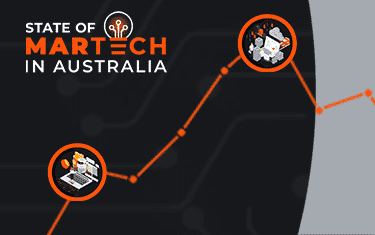As economic conditions tighten, CMOs are prioritising MarTech solutions that deliver tangible results. The way forward is to optimise your existing stack, leverage first-party data, and build resilience for long-term success.
In today's economic climate, CMOs and marketing leaders are under pressure to maximise the return on their MarTech investments.
According to a recent study, 89% of companies are involved in digital transformation, yet only about a third are seeing the expected financial benefits from these initiatives. This gap is prompting many marketing leaders to reconsider their technology investments and adopt strategies that maximise ROI from tools they already have in place.
Maximising MarTech ROI means leveraging what’s already in place, enhancing personalisation, integrating technology across functions, and building resilience through data-driven decision-making.

Here are 5 key MarTech strategies that marketing leaders should focus on for 2025:
Data-Driven Personalisation and First-Party Data Collection
Leveraging first-party data is becoming increasingly important, especially with the phase-out of third-party cookies. Prioritise tools that enable them to collect, manage, and utilise first-party data effectively for personalised marketing efforts.
First-party data provides a direct window into consumer behaviour, helping brands better to understand customer needs, preferences, and buying patterns. With this insight, marketing leaders can create more targeted and meaningful marketing campaigns that drive higher conversion rates and foster customer loyalty.
By maximising the use of first-party data, businesses can optimise customer engagement and build trust, which is crucial in an era where data privacy is a top concern.
Optimising Existing MarTech Stacks for Greater Efficiency
Rather than pursuing new technologies, marketing leaders should review their current MarTech stacks to ensure they get the most out of their existing tools. This approach ensures that companies are not overspending on redundant or underutilised platforms.
CMOs can improve the cost-efficiency of their marketing operations by refining workflows, integrating systems, and effectively using automation.

For example, HubSpot's CRM, analytics, and automation integration enables businesses to gather actionable insights, automate marketing workflows, and personalise customer journeys.
This leads to more efficient and data-driven marketing efforts, which result in more efficient marketing strategies aligned with business goals, all without additional investment.
Integrating MarTech Across the Organisation
MarTech is no longer just the domain of marketing teams. Increasingly, it is being integrated across other areas of the organisation, such as IT, sales, and operations, to support broader digital transformation goals.
This shift means CMOs must work more closely with CIOs and CTOs to ensure that MarTech tools are scalable, flexible, and aligned with the company’s objectives.
By integrating MarTech with the larger digital infrastructure, businesses can create a unified system that supports operational efficiency and innovation.
“Your MarTech stack can deliver value by saving you money up-front on costs – for example, by incorporating fewer expensive components. But also consider other value points, such as the customer experience it enables, the insights in provides, or the dynamic flexibility it delivers in responding to challenges in real time.”
- Benni Lucas, Head of Marketing Technology, Resolution Digital
Agility and Speed in Marketing Operations
Economic pressures are forcing businesses to be more agile in their marketing operations. MarTech solutions, particularly automation tools, are critical in helping CMOs respond quickly to shifting market conditions.
By automating routine tasks like campaign management, ad spend optimisation, and performance tracking, businesses can operate more efficiently and quickly.
Real-time data insights allow marketing teams to promptly adjust their strategies, ensuring they stay relevant in a changing market. This agility also helps businesses control costs by enabling rapid testing and iteration of marketing tactics, reducing waste, and focusing on what works.
Building Resilience through Predictive Analytics and AI
Resilience is key. MarTech solutions incorporating predictive analytics and AI-driven insights are helping businesses forecast market trends, anticipate consumer behaviour shifts, and plan for multiple scenarios.
CMOs should leverage these tools to make more informed, data-driven decisions that ensure their marketing strategies remain effective despite unpredictability.
State of MarTech in Australia Report
The MarTech landscape has quite literally exploded in the last few years, with over 14,100 products available.
The new State of MarTech 2024 report aims to provide insights into the short-term future of digital marketing and to provide an updated perspective on our rapidly changing media landscape.

.png/?)
